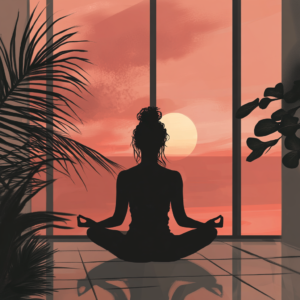1. Introduction
The Ultimate Guide to Stress Relief Through Meditation is designed to help you understand how meditation can serve as a powerful tool for reducing stress and improving overall well-being. In today’s fast-paced world, stress affects every aspect of our lives—from physical health to emotional balance. This guide explains the science behind meditation, dispels common myths, and provides practical steps for integrating meditation into your daily routine. By embracing The Ultimate Guide to Stress Relief Through Meditation, you will learn simple yet effective techniques to calm your mind and build resilience against everyday pressures. If you are looking for more information on mindful practices, check out our article on Mindful Living: 7 Daily Habits to Boost Wellbeing.
Overview of Meditation and Stress Relief
Meditation is more than just a relaxation technique; it is a comprehensive practice that can transform the way you perceive and react to stress. In this guide, we emphasize that even short periods of meditation—just 10 to 15 minutes a day—can significantly reduce stress and help you maintain a balanced life. The Ultimate Guide to Stress Relief Through Meditation highlights that consistent practice leads to long-term benefits and improved mental clarity.
The Importance of Mindfulness in Daily Life
Incorporating mindfulness into your daily routine is essential for managing modern stressors. Mindfulness allows you to stay present, avoid overthinking, and develop a proactive attitude toward challenges. The insights provided in The Ultimate Guide to Stress Relief Through Meditation are based on both ancient wisdom and modern scientific research, ensuring you receive a well-rounded approach to stress management.

2. Understanding Stress and Its Impact
Stress is a natural part of life, but when it becomes chronic, it can lead to serious health issues. The Ultimate Guide to Stress Relief Through Meditation explains that understanding the nature of stress is the first step toward managing it effectively.
Physiological Effects of Stress
When the body perceives a threat, it releases stress hormones such as cortisol and adrenaline. These hormones trigger the fight-or-flight response, which, if activated too frequently, can cause high blood pressure, weakened immune function, and other health problems. Learning how meditation can modulate this response is crucial to reducing its negative impact.
Psychological and Emotional Consequences
Chronic stress not only affects the body but also takes a toll on mental health. Anxiety, depression, and irritability are common outcomes of sustained stress. The Ultimate Guide to Stress Relief Through Meditation discusses how meditation can provide a buffer against these psychological challenges by promoting a state of calm and helping you manage your emotions more effectively.
Societal Impacts of Stress
Beyond personal health, stress significantly affects social interactions, work performance, and overall quality of life. When individuals are overwhelmed, relationships may suffer and productivity can decline, impacting both personal and professional environments. By adopting effective stress relief techniques—like those outlined in The Ultimate Guide to Stress Relief Through Meditation—you can enhance not only your well-being but also your interpersonal dynamics and career success. For more in-depth, research-based insights on the broader effects of stress, visit the American Psychological Association’s stress topic page here.
3. The Science Behind Meditation for Stress Relief
Scientific research provides strong evidence that meditation reduces stress and enhances mental health. The Ultimate Guide to Stress Relief Through Meditation draws on studies that show how meditation transforms brain function and structure.
Neurological Benefits of Meditation
Regular meditation practice has been shown to increase the thickness of the prefrontal cortex, the part of the brain responsible for executive functions such as decision-making and emotional regulation. Neuroimaging studies indicate that meditation can also reduce activity in the amygdala, the brain’s stress center, leading to a calmer, more focused mind.
Hormonal Changes and Relaxation
During meditation, the body enters a state of relaxation that counters the fight-or-flight response. Research demonstrates that consistent meditation practice lowers cortisol levels and balances other stress hormones. This hormonal regulation is essential for reducing chronic stress and improving overall health.
Scientific Studies Supporting Meditation
Numerous studies have validated the effectiveness of meditation in reducing stress. For instance, research published by Harvard Health Publishing shows that even short daily meditation sessions can lead to measurable decreases in stress markers. The Ultimate Guide to Stress Relief Through Meditation is grounded in such scientific findings, ensuring that the techniques shared here are both effective and evidence-based.
4. Common Meditation Techniques for Stress Relief
There are several meditation techniques that can help you achieve stress relief, each with its own unique benefits. The Ultimate Guide to Stress Relief Through Meditation provides a comprehensive overview of these methods, so you can choose the one that best suits your lifestyle.
Mindfulness Meditation
Mindfulness meditation involves focusing on the present moment and observing your thoughts without judgment. This technique helps to create a mental space where stress and anxiety are reduced. It is one of the most widely practiced methods due to its simplicity and effectiveness.
Guided Meditation
Guided meditation is particularly useful for beginners. In this technique, an instructor leads you through a meditation session, either in person or via audio or video. This method helps maintain focus and offers structure, making it easier to incorporate meditation into your daily routine. To explore a high-quality guided meditation, check out this video from Yoga With Adriene.
Breathing Exercises
Simple breathing exercises, such as diaphragmatic breathing or the 4-7-8 technique, are powerful tools for immediate stress relief. Focusing on your breath can quickly bring you back to the present moment and help calm your nervous system. The Ultimate Guide to Stress Relief Through Meditation emphasizes that these techniques are perfect for busy moments when you need instant relaxation.
Body Scan Meditation
A body scan meditation involves systematically focusing on different parts of your body, noticing sensations without judgment. This practice increases body awareness and can help release tension that accumulates from stress. By regularly practicing a body scan, you can identify and alleviate physical stress signals before they escalate.
5. Benefits of Meditation for Stress Relief
Meditation offers numerous benefits for those seeking to reduce stress and improve overall well-being. The Ultimate Guide to Stress Relief Through Meditation reveals that regular practice not only alleviates stress but also enhances mental clarity, emotional balance, and physical health.
Stress Reduction and Health Improvements
Meditation helps lower blood pressure, reduce cortisol levels, and improve cardiovascular health. These physiological changes contribute to a reduction in overall stress and promote a healthier body. Regular practice can transform how you respond to stressful situations, making them more manageable and less overwhelming.
Enhanced Mental Focus and Clarity
One of the most significant benefits of meditation is its ability to improve concentration and mental clarity. By reducing mental clutter, meditation allows you to approach tasks with a clearer mind and increased efficiency. This enhanced focus translates into better performance at work and in personal pursuits.
Emotional Balance and Resilience
Meditation fosters emotional stability by teaching you to observe your thoughts and feelings without reacting impulsively. This increased self-awareness leads to greater emotional intelligence and resilience, enabling you to navigate challenging situations with calm and rationality. The Ultimate Guide to Stress Relief Through Meditation illustrates how these benefits accumulate over time, resulting in a more balanced and fulfilling life.
Improved Sleep and Relaxation
Many practitioners find that meditation significantly improves sleep quality. By calming the mind and reducing stress, meditation creates a conducive environment for restorative sleep. Better sleep leads to enhanced energy levels, improved mood, and overall better health.
Productivity and Personal Growth
As you reduce stress and clear mental clutter, you naturally become more productive. With improved focus and decision-making abilities, you can achieve more in your personal and professional life. Meditation also encourages continuous personal growth by fostering a mindset of mindfulness and self-reflection.

6. How to Start Your Meditation Practice
Starting a meditation practice might seem challenging, but The Ultimate Guide to Stress Relief Through Meditation assures you that the key is to begin with small, manageable sessions and gradually build consistency.
Creating a Peaceful Space
Find a quiet, comfortable space where you can meditate without interruptions. This could be a dedicated corner in your home or even a peaceful outdoor spot. The environment you choose can greatly influence the effectiveness of your practice, so aim for a setting that promotes relaxation.
Establishing a Routine
Begin with short sessions of 5 to 10 minutes and gradually increase the duration as you become more comfortable. The goal is to create a daily habit that fits naturally into your schedule. Over time, meditation will become an essential part of your routine, providing ongoing stress relief and mental clarity.
Focusing on Breath and Mindfulness
The cornerstone of effective meditation is focusing on your breath. Close your eyes, take deep, slow breaths, and concentrate on the rhythm of your breathing. When your mind wanders, gently redirect your focus back to your breath. This simple practice is at the heart of The Ultimate Guide to Stress Relief Through Meditation and is proven to reduce stress significantly.
Practical Tips for Beginners
For additional guidance on starting your meditation journey, consider using guided meditation apps or online resources. There are many free tools available that can help structure your practice and keep you motivated. For example, you can explore our article on Mindful Living: 7 Daily Habits to Boost Wellbeing for further tips and inspiration.
7. Integrating Meditation into a Busy Lifestyle
In today’s fast-paced world, finding time for meditation can be challenging. However, The Ultimate Guide to Stress Relief Through Meditation offers practical solutions to incorporate meditation into even the busiest schedules.
Short Sessions for Instant Relief
Even short sessions can provide significant benefits. Consider taking a 5-minute break during your workday to focus on your breath. These mini sessions can help reset your mind, reduce stress, and increase your overall productivity.
Utilizing Technology to Stay Consistent
Modern technology offers a variety of apps and online resources to help you maintain your meditation practice. Guided meditation videos, timers, and mindfulness apps are all excellent tools to keep you on track. One highly recommended resource is the Yoga With Adriene YouTube channel, which provides accessible guided meditations that fit into a busy lifestyle.
Integrating Meditation with Daily Activities
Another effective strategy is to integrate meditation with your existing routine. For example, practice mindful breathing during your commute, or use a few minutes before a meeting to center yourself. This approach makes meditation a natural part of your day rather than an additional task.

Transform your Yoga practice with the Absolute Yoga Course!Discover how to unite body, mind and spirit in a single online program, led by a renowned instructor. In Absolute Yoga, you will:
- Learn basic and advanced postures with practical step-by-step classes;
- Master meditation techniques to reduce stress and increase focus;
- Immerse yourself in the philosophy and history of yoga, understanding its roots and applications in everyday life;
- Develop your physical, mental and emotional well-being, regardless of your level of experience.
8. Advanced Meditation Practices for Deep Stress Relief
Once you have established a regular meditation practice, you might want to explore advanced techniques to further reduce stress and enhance your mindfulness. The Ultimate Guide to Stress Relief Through Meditation outlines several methods that can take your practice to the next level.
Transcendental Meditation
Transcendental Meditation involves the use of a mantra to help the mind settle into a state of deep rest and heightened awareness. This technique is renowned for its profound relaxation effects and is especially beneficial for those seeking to break through mental barriers and achieve a deep state of calm.
Body Scan Meditation
Body scan meditation is a technique where you systematically focus on each part of your body, releasing tension and promoting relaxation. This practice not only helps in identifying areas of stress but also facilitates a complete mental and physical reset. Incorporating this practice into your routine can lead to deeper stress relief and overall improved health.
Loving-Kindness Meditation
Loving-kindness meditation focuses on cultivating compassion and empathy for oneself and others. This practice can reduce emotional stress and foster positive interpersonal relationships. By generating feelings of love and kindness, you can counterbalance the negative effects of stress and promote a more harmonious state of mind.
Combining Techniques for Maximum Benefit
For advanced practitioners, combining different meditation techniques can create a more robust practice. Experiment with blending mindfulness, transcendental meditation, and body scans to tailor a practice that uniquely suits your needs. The Ultimate Guide to Stress Relief Through Meditation encourages continuous exploration and adaptation as you deepen your meditation journey.
9. Frequently Asked Questions (FAQ)
Q1: How long should I meditate each day?
A: Begin with 5 to 10 minutes daily and gradually extend your sessions as you become more comfortable. The Ultimate Guide to Stress Relief Through Meditation emphasizes that consistency is key to long-term benefits.
Q2: What is the best meditation technique for stress relief?
A: There is no one-size-fits-all answer; many find mindfulness and guided meditations to be highly effective. Experiment with various methods to see which resonates with you, as highlighted in The Ultimate Guide to Stress Relief Through Meditation.
Q3: Can meditation really lower my stress levels?
A: Yes, scientific studies have shown that regular meditation significantly reduces cortisol levels and promotes a calmer state of mind.
Q4: How do I handle distractions during meditation?
A: It’s normal for your mind to wander. When this happens, gently bring your focus back to your breath without judgment. This technique is a core principle in The Ultimate Guide to Stress Relief Through Meditation.
Q5: Is it possible to meditate while being busy?
A: Absolutely. Short, focused meditation sessions can be integrated into a busy schedule, even if it’s just a few minutes throughout the day.
Q6: Can meditation improve my overall health?
A: Yes, regular meditation contributes to reduced stress, improved mental clarity, and better emotional regulation, leading to overall enhanced well-being.
Q7: What additional resources can help me deepen my meditation practice?
A: Consider exploring reputable meditation apps, online courses, and guided sessions available on platforms like YouTube and our blog posts, such as Mindful Living: 7 Daily Habits to Boost Wellbeing.
10. Conclusion
The Ultimate Guide to Stress Relief Through Meditation offers a comprehensive roadmap to reducing stress and enhancing well-being through the art of meditation. By understanding the science behind meditation, exploring various techniques, and integrating a consistent practice into your daily routine, you can achieve profound relaxation and mental clarity. This guide emphasizes that even short daily sessions can yield significant benefits and that meditation is accessible to everyone, regardless of a busy lifestyle. Whether you’re just beginning your journey or looking to deepen your practice, the insights shared here can help you transform stress into a catalyst for growth and self-improvement.
Thank you for reading The Ultimate Guide to Stress Relief Through Meditation. May these practices help you achieve a calm, focused, and balanced life.